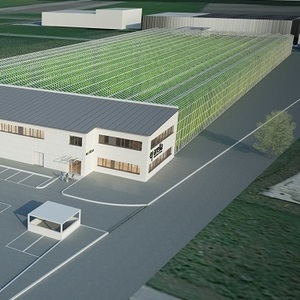Europe's largest algae omega-3 plant uses Schott glass tubes

Photo: ecoduna
July 18, 2017
BY Schott North America Inc.
ecoduna selected Schott after a successful 18-month test of Duran glass tubes in ecoduna’s first vertical photobioreactor (PBR) plant. When the time came to build the new facility, ecoduna turned to Schott to deliver several hundred thousand units that can hold more than 780,000 liters of photoactive volume. In all, the facility will produce 100 tons of algae annually.
eparella, a subsidiary of ecoduna, will operate the sustainable 2.5-acre plant. It is scheduled to be built this year using 143 miles of glass tubing, enough to nearly stretch across Austria. Production will start in 2018.
In vertical PBRs, algae are grown in transparent tubes filled with water and nutrients to fuel photosynthesis. ecoduna produces and harvests different algae such as chlorella or spirulina for use as food supplements, cosmetics ingredients, animal food and feed, biofuel, fertilizer, and even as pharmaceutical components. The market volume of algae production has already exceeded $1 billion and continues to grow.
Omega-3 fatty acids are one driver of that growth. They’re considered important for brain health, but they cannot be produced by the human body. They must be found in food, but the most common sources, such as oily fishes like salmon, mackerel, and tuna, are prone to overfishing. By growing omega-3 fatty acids in algae, ecoduna helps take pressure off of fish populations and provides a cost-efficient source of this crucial nutrient.
As manufacturers of PBRs hone the technology, they increasingly convert their facilities from plastic to glass. Glass’s cleanability, strength, and clarity improve output and lower costs. Companies expect to replace plastic tubes and panels every few years, while glass can last longer than five decades. In the long run, glass tubing is more cost effective.
“The transition from plastic to glass was an important step for our company,” said Silvia Fluch, chief operating officer for ecoduna. “The use of recyclable glass in our manufacturing plant perfectly fits our idea of being sustainable and protecting our environment and nature.”
Duran is a registered trademark of DWK Life Sciences GmbH.
Advertisement
Advertisement
Related Stories
The USDA maintained its outlook for 2025-’26 soybean oil use in biofuel production in its latest World Agricultural Supply and Demand Estimates report, released Aug. 12. The forecast for soybean oil prices was also unchanged.
U.S. soybean production for 2025 is forecast at 4.29 billion bushels, down 2% when compared to last year, according to the USDA National Agricultural Statistics Service’s latest monthly Crop Production report, released Aug. 12.
California’s new specified source feedstock attestation requirement: A critical new compliance step for renewable fuel producers
As of July 2025, California’s SCFS requires renewable fuel producers using specified source feedstocks to secure attestation letters reaching back to the point of origin. This marks a significant shift in compliance expectations.
At the University of Missouri, plant biochemist Jay Thelen is using arabidopsis as a powerful model to explore ways to boost oil production — an important step toward creating more sustainable, plant-based energy sources.
Iowa farmers have a new market opportunity for their 2025 soybean crop. Landus is expanding its Clean Fuel Regulation initiative, made possible by recent policy changes expected to increase Canada's demand for liquid biofuel.
Upcoming Events










